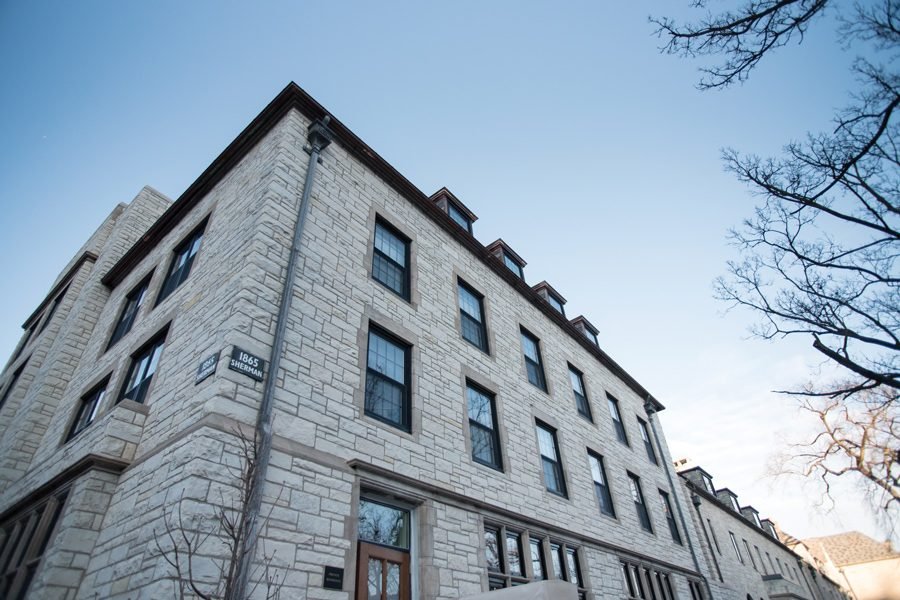NU gives heightened COVID-19 case positivity warnings to specific dorm floors
Daily file photo by Colin Boyle
Willard Residential College. Residents on the second floor were one of three floors across campus notified of heightened positivity rates.
February 20, 2022
Northwestern Student Affairs sent COVID-19 notices to students in some residence halls last week about heightened positivity rates on certain floors.
Three residence halls received these emails, according to University spokesperson Jon Yates. Residents in the Ayers College of Commerce and Industry received notices on Wednesday, while those in Willard Residential College and Kemper Hall received emails on Friday evening.
“Residential Services is monitoring a heightened COVID positivity rate in Willard Hall,” the Willard email stated. “Fluctuations in positivity rates are natural and to be expected in any community larger than a household.”
Emails encouraged students to follow COVID-19 protective measures, such as masking, testing and social distancing. The University mandated Ayers’ fourth floor residents complete two rounds of testing, one by Friday and one by Feb. 22. The email also asked residents on the fourth floor of Ayers and those on the second floors of Kemper and Willard to stop hosting guests through Feb. 22 and Feb. 24, respectively.
Yates did not specify the number of cases in residence spaces that warrant a University notice. He clarified that none of the buildings have been placed on lockdown.
“The University reviews positive cases daily and sometimes identifies trends on individual floors or areas within residence halls,” Yates said. “In recent days, we identified three floors in three different residence halls that we felt required additional monitoring.”
McCormick freshman Sneh Deshpande, who lives on Ayers’ fourth floor, said he was already feeling symptoms when he received the email. While he tested negative on a rapid test Wednesday, he tested positive on a subsequent rapid PCR on Thursday. Shortly after, Deshpande moved to 1835 Hinman to begin his quarantine.
Because he is fully vaccinated and boosted, Deshpande said he’s not too worried about the virus. However, he said his friends in Ayers had mixed reactions to the notice.
“One of my really close friends hasn’t been experiencing any symptoms so he’s been pretty relaxed,” Deshpande said. “But one of my other friends was kind of scared because he takes COVID with a lot more precaution. He was a bit afraid that this was going to affect him in terms of his academics, so he immediately got tested.”
Weinberg sophomore Anthony Kang, who lives on the second floor of Willard, said he felt concerned for his personal health after receiving the notice. Over the course of Winter Quarter, Kang said he’s noticed some students are less cautious about wearing their masks properly and following other COVID protocols.
Kang said the email sparked important conversations for Willard residents.
“Once the email came out, there was a lot of discussion … in our GroupMe about how people should be more vigilant, and it had a lot of support,” Kang said. “I’m very happy to see that, and I think this is a sign that people will be more vigilant in the future.”
Kang said he’s noticed the positivity rate in Willard going up for a while. He said on Saturday, he found out by chance that another person on his floor tested positive. Kang said he’s disappointed NU ended formal contact tracing measures because he wants to know if he’s been exposed for his own safety. He added the dorm email made him take COVID-19 more seriously.
Although Deshpande said he’s less concerned about the virus than he was at the start of the pandemic, he said he doesn’t see how these limited University responses help students. He said if the University was really concerned about maintaining student safety, they would be more proactive about testing measures.
“I don’t know how much these emails would help because if there is an outbreak, by the time the University’s recognized it … people who are asymptomatic could have gone around and infected a lot of people,” Deshpande said.
Email: joannahou2025@u.northwestern.edu
Twitter: @joannah_11
Related Stories:
— NU profs create their own contact tracing systems to ensure COVID-19 safety in the classroom
— University’s updated quarantine and isolation protocol inconsistent with CDC’s recommendations



